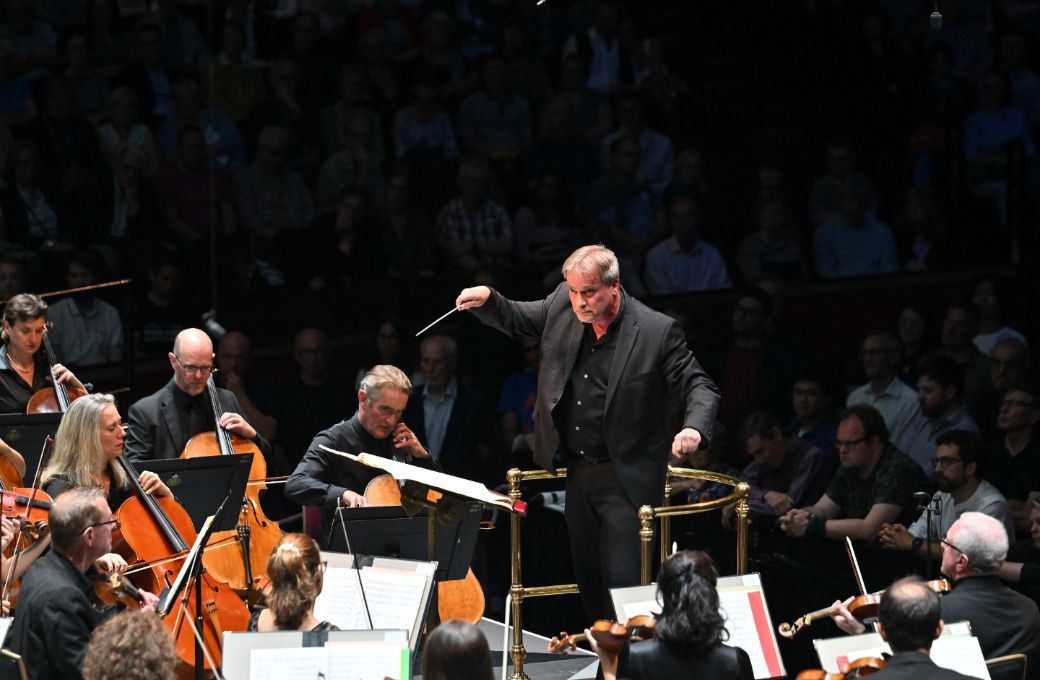The BBC Philharmonic arrived at the Proms for the third of their four offerings, with their Chief Conductor John Storgårds at the helm. A new BBC commission nestled alongside two giants, Walton’s Violin Concerto, followed by Sibelius’ majestic First Symphony.

Irish composer Gerald Barry clearly had great fun here. Rather than throwing the kitchen sink of effects and noises at us, he defies expectations, instead exploring what can be done within a very limited and constrained dynamic palette. Kafka’s Earplugs plays with the idea of being inside Kafka’s head, trying to block out the noises of the outside world. The whole piece never rises to a loud dynamic and we have a sense that there is more going on than our ears can catch. Slow shifting, dark, low rumbles dominate, with muted strings present but often barely audible. After a long held chord, the pace quickens, but only to a relentless trot. The brass occasionally break through with sarcastic interjections, and the strings give us swells and surges, but all as if through a veil. The overall effect is actually rather disconcerting, making one almost strain to catch what is going on beyond the earplugs. Storgårds and the BBC Philharmonic managed to effectively keep a lid on things throughout, yet occasionally allowing tantalising glimpses to break through the texture.
The sweetly lyrical opening of Walton’s Violin Concerto was written to show off Heifetz’s legendary playing. Indeed, violinist James Ehnes gave us warm tones, matched by the bassoon and oboe countermelodies. Yet once the central section got underway, the woodwind occasionally dominated, although Ehnes managed to draw the audience into the closer, more lightly orchestrated sections. Storgårds later marshalled the orchestral forces for an impressively warlike explosion, before Ehnes’ lyricism returned for the pianissimo conclusion. The middle movement, “alla Napolitana”, has a wild tarantella (supposedly inspired following a tarantula bite he experienced) and Ehnes was suitably wild in its virtuosic passages, but he also gave us delicate decorative adornments to the horn’s canzonetta theme. More lyricism from Ehnes in the finale, although the faster sections had pointed precision, and the elegiac cadenza was particularly beautifully executed. Storgårds mostly managed the balance within the challenges of the acoustic and orchestral ensemble was tight throughout. Ehnes then treated us to a fleet-of-foot account of the finale to J.S. Bach’s Sonata no. 3 in C major, BWV 1005, with seamlessly smooth string crossing and sensitive use of echo effects.
Storgårds and the BBC Philharmonic ended with a suitably majestic performance of Sibelius’ Symphony no. 1. John Bradbury’s opening clarinet solo set the tone, with effortless control and expression, followed by immediate energy from the strings. With a sense of urgency, Storgård steered the orchestra to a sunlit climax. In contrast, the slow movement was full of longing, with extra control of pianissimo repeats of the mourning tune from the strings adding heart-breaking poignancy. Timpanist Paul Turner set the Scherzo off racing, matched with tight precision in the orchestral rhythms. Heart-wrenching strings set up the finale, followed by plaintive flute and oboe duets, and then once things got really going, Storgårds set off at a rapid pace. Ensemble here was impressively tight, given the tempo, and Storgårds continued to drive on throughout, creating just the right intensity and expectation for the scale up to the big tune, which finally arrived with weighty passion, with just enough added edge to avoid stodge. Storgårds’ drive and the tightness of the BBC Philharmonic’s ensemble, as well as strong solo work from many, made for a memorable performance here.


